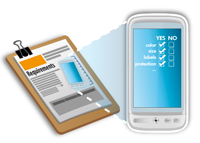
Many small importers start buying in China, and then end up feeling a need for quality control (QC). They haven’t gotten assistance from specialized QC firms. This article outlines what buyers need to know to take full advantage of product inspections.
Defining clear expectations
Arranging a QC inspection will force you to get organized and to define your expectations.
The inspection company will ask for your requirements regarding the product itself (size, color…), its packaging (retail packing, export carton…), and the tests it should pass (example: resisting a drop test). They can also suggest some elements to check, if necessary in relation with a laboratory.
The best is of course to do this before production starts, and update it little by little. How to do it yourself? Read the article written by Andrew Reich about developing a product QC Checklist.
Note: your supplier’s interest is to make the inspection easy to pass, so you are not advised to let him book inspections on your behalf.
Let your supplier know about inspections early
Telling your supplier that a shipment will be inspected has a direct impact on how careful they will be with your production.
You should also ask your supplier to confirm an inspection date in advance. Their planning should take into account the time for inspection and the time for your decision. In case of a final inspection (before shipment), the inspection date should be at least 2 days earlier than the ex-factory date (which itself is several days before the shipment date).
Tie payments to quality acceptance
You should mention that an accepted inspection report will be necessary for triggering the final payment. Write it in the OEM contract, in the order sheet and/or in the letter of credit. This is the best signal you can send to your supplier: you are serious about quality and he should be, too.
However, don’t put too much pressure on your supplier. Some buyers say: “you can’t ship unless I see a passed report, and you pay for air freight if you miss the deadline”. This is counter-productive, for two reasons. First, many inspections are failed for reasons that are actually acceptable for the buyer. So the buyer always has the final word. Second, a desperate factory often tries to bribe the inspector.
What you should tell your supplier is this:
- The report will be a basis for communication between us.
- I expect you to respect my quality standard, and we’ll advise what to do if issues are noticed.
- I count on you to facilitate the inspector’s job; and any type of bribery is strictly forbidden.
Prepare inspections in advance
Some importers call me and say “I have a very urgent inspection, can you send somebody to the factory tomorrow?” A small inspection company is flexible to a point, but there are two constraints:
- It is necessary to take some time to really understand the buyer’s needs. There are actually lots of parameters to set for quality inspections. For consumer goods, about 80% of inspections are performed under the same settings, but what if you are in the 20% of cases where it not appropriate? For more information, you can read this article: quality control basics concepts.
- The QC firm typically needs to communicate with the factory, prepare the inspection plan and the check points, submit a quotation, and arrange inspector(s).
What happens, right after the inspection?
Inspection reports are illustrated with lots of photos. The inspection firm should send it on inspection day—at worst the day after. Then you should be able to take a decision: you accept the quality or you don’t. If you refuse, you might want a re-inspection (usually re-invoiced to the supplier) to confirm the corrective actions.
You may also choose to trust your supplier and ask him to do a few quick corrections.
When should inspections take place?
Finding that products are unsellable once everything is produced is not the optimal solution. Most importers don’t know that QC firms can help them prevent such disasters.
What type of assistance can they provide?
- First, the most important is to qualify a factory and ensure production takes place there. (Side note: for large orders, a specialized lawyer can also assist you with a solid OEM contract.)
- The second most important action you can take is to check quality early in the production cycle. It means confirming that the first products are correctly processed and acceptable; it can also mean checking the components before they are processed into finished products. At this stage, corrective actions can be implemented and delays can be contained.
- A final inspection, before shipment, can help confirm product quality and the respect of the packaging requirements.
Do you want to check up on your supplier, or help him?
A classic misconception is that inspections are only useful in blocking unacceptable products. If it takes place just before shipment, this is true. But inspectors who go to a factory earlier are actually helping the factory do the job right (and avoid costly rework and delays).
You communicate with a salesperson. But the technicians on the floor are often not familiar with the specifics of your order. And they usually don’t speak English, so they cannot read the documents you send. An inspector can ensure that no important information is lost along the way.
No comments:
Post a Comment